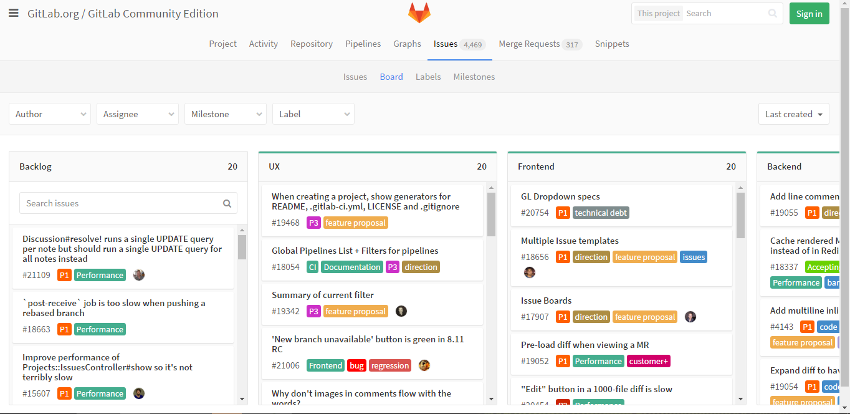 NEWS
NEWS
 NEWS
NEWS
 NEWS
NEWS
Managing application projects is about to become much easier for GitLab Inc. users. The startup today introduced an issue tracking feature for its fast-growing code hosting platform that promises to help development teams organize the features, enhancements and other items on their to-do lists more effectively.
The GitLab Issue Board is a sleek graphical panel that provides the ability to display tasks as digital note cards and sort them into neat columns each representing a different part of the application lifecycle. By default, new panels start only with a “Backlog” section for items still in the queue and a “Done” list that shows completed tasks, but users are able to easily add more tabs if necessary. GitLab says that a view can be broken up into as many lists as a project requires.
An enterprise development team working on an internal client-server service, for instance, could create separate sections to hold backend tasks, issues related to the workload’s desktop client and user experience bugs. Users with such crowded boards can also take advantage of GitLab’s built in tagging mechanism to label each item with color-coded tags denoting its purpose. The feature not only helps quickly make sense of the cards on a given board but also makes it easier to find specific items in the process. When an engineer wants to check if there are new bug fix requests concerning their part of a project, they can simply filter the board view based on the appropriate tags.
And to make the process even smoother, GitLab has set the tagging mechanism to automatically refresh labels when an entry is moved between columns. This means that a note card tagged with the word “Backlog” will be modified if it’s moved the “Done” section of a board. The startup hopes that the functionality will make users of its code hosting platform less likely to employ third party issue trackers like rival Atlassian Inc.’s JIRA.
Moreover, GitLab Issue Board should also put it in a better position to compete with arch-nemesis GitHub Inc., which has been offering a native issue tracker of its own for quite some time now. The companies can be expected to adding more and more value-added features to their respective platforms as the code management market continues to heat up.
Support our mission to keep content open and free by engaging with theCUBE community. Join theCUBE’s Alumni Trust Network, where technology leaders connect, share intelligence and create opportunities.
Founded by tech visionaries John Furrier and Dave Vellante, SiliconANGLE Media has built a dynamic ecosystem of industry-leading digital media brands that reach 15+ million elite tech professionals. Our new proprietary theCUBE AI Video Cloud is breaking ground in audience interaction, leveraging theCUBEai.com neural network to help technology companies make data-driven decisions and stay at the forefront of industry conversations.